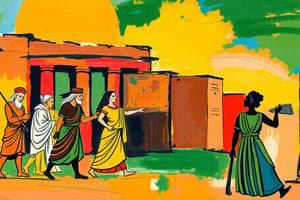Podcast
Questions and Answers
What was a significant achievement during Ancient History?
What was a significant achievement during Ancient History?
- Industrialization of societies
- Development of writing (correct)
- Establishment of the Renaissance
- Formation of nation-states
Which factor is associated with the Middle Ages?
Which factor is associated with the Middle Ages?
- Scientific Revolution
- Spread of Islam (correct)
- Industrial Revolution
- Age of Exploration
What does social history primarily focus on?
What does social history primarily focus on?
- Environmental interactions
- Political governance structures
- Lives of ordinary people (correct)
- Cultural expressions and practices
Which historical period is characterized by the Industrial Revolution?
Which historical period is characterized by the Industrial Revolution?
Which major theme in history addresses the evolution of trade systems?
Which major theme in history addresses the evolution of trade systems?
Who is known as the 'Father of History'?
Who is known as the 'Father of History'?
Which method of historical study focuses on original documents and firsthand accounts?
Which method of historical study focuses on original documents and firsthand accounts?
What is one of the key insights gained from studying history today?
What is one of the key insights gained from studying history today?
Flashcards are hidden until you start studying
Study Notes
Definition and Importance
- History: The study of past events, particularly in human affairs.
- Importance:
- Understanding societal changes and developments.
- Learning from past errors and successes.
- Insight into cultural identities and shared values.
Key Historical Periods
-
Prehistoric Era:
- Time before written records.
- Divided into the Stone Age, Bronze Age, and Iron Age.
-
Ancient History (c. 3000 BCE - 500 CE):
- Rise of civilizations (e.g., Mesopotamia, Egypt, Indus Valley, China, Greece, Rome).
- Development of writing, trade, and governance.
-
Middle Ages (500 - 1500 CE):
- Feudalism dominates Europe.
- Spread of Islam and its empires.
- The Renaissance begins late in this period.
-
Early Modern Period (1500 - 1800 CE):
- Age of Exploration and Discovery.
- Scientific Revolution changes understanding of the natural world.
- Rise of nation-states and colonialism.
-
Modern History (1800 - Present):
- Industrial Revolution transforms economies and societies.
- World Wars reshape global politics.
- Cold War leads to significant geopolitical tensions.
Historical Methods
- Primary Sources: Original documents, artifacts, and firsthand accounts.
- Secondary Sources: Analyses and interpretations of primary sources.
- Oral History: Accounts of the past given through spoken word.
Major Themes in History
- Conflict and War: Causes and impacts of wars (e.g., globalization, colonialism).
- Culture and Identity: Development of cultural norms, ethnic identities, and philosophies.
- Economics and Trade: Evolution of trade systems and economic practices.
- Politics and Governance: Structures of power and their historical development.
Notable Historians
- Herodotus: Often referred to as the "Father of History."
- Thucydides: Known for his work on the Peloponnesian War.
- Marc Bloch and Lucien Febvre: Founders of the Annales School, focusing on social history.
Modern Approaches
- Cultural History: Examines cultural expressions and practices.
- Social History: Focus on the lives of ordinary people and societal structures.
- Environmental History: Studies interactions between humans and their environment.
Significance of History in Today’s Context
- Provides perspective on current events.
- Helps understand the roots of social issues, political conflicts, and cultural dynamics.
- Encourages critical thinking and informed citizenship.
Definition and Importance
- History is the study of past events, especially in human affairs.
- It helps us understand how societies change and develop.
- History teaches us from past mistakes and successes.
- It offers insight into cultural identities and shared values.
Key Historical Periods
- The Prehistoric Era was a period before written records.
- It is divided into the Stone Age, Bronze Age, and Iron Age.
- Ancient History spanned from approximately 3000 BCE to 500 CE.
- This period saw the rise of civilizations in Mesopotamia, Egypt, the Indus Valley, China, Greece, and Rome.
- Key developments included writing, trade, and governance.
- The Middle Ages (500 to 1500 CE) was dominated by feudalism in Europe.
- The spread of Islam and its empires occurred during this time.
- The Renaissance, a period of rebirth of art and culture, began towards the end of this period.
- The Early Modern Period (1500 to 1800 CE) was marked by the Age of Exploration and Discovery.
- The Scientific Revolution drastically changed understanding of the natural world.
- Nation-states rose, and colonialism became a prominent feature.
- Modern History (1800 to present) witnessed the Industrial Revolution, transforming economies and societies.
- World Wars drastically altered global politics.
- The Cold War created significant geopolitical tensions.
Historical Methods
- Primary sources are original documents, artifacts, and firsthand accounts.
- Secondary sources analyze and interpret primary sources.
- Oral history relies on accounts of the past through spoken word.
Major Themes in History
- Conflict and War: Studying the causes and impacts of wars, including factors like globalization and colonialism.
- Culture and Identity: Exploring the development of cultural norms, ethnic identities, and philosophies.
- Economics and Trade: Examining the evolution of trade systems and economic practices.
- Politics and Governance: Understanding the development and structure of power systems.
Notable Historians
- Herodotus is often referred to as the "Father of History."
- Thucydides is known for his work on the Peloponnesian War.
- Marc Bloch and Lucien Febvre were founders of the Annales School, emphasizing social history.
Modern Approaches
- Cultural History examines cultural expressions and practices.
- Social History focuses on the lives of ordinary people and societal structures.
- Environmental History studies the relationships between humans and their environment.
Significance of History in Today’s Context
- History provides perspective on current events.
- It helps us understand the root causes of social issues, political conflicts, and cultural dynamics.
- History encourages critical thinking and informed citizenship.
Studying That Suits You
Use AI to generate personalized quizzes and flashcards to suit your learning preferences.




